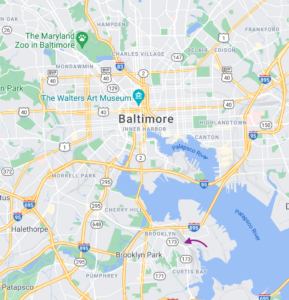Launched in 2019, the PLACE Collaboratory is a network of partnerships between colleges and community organizations that are using humanities, cultural and listening practices to help solve community challenges. Eight partnerships from the east to the west coast are tackling a variety of issues, such as climate change and urban resilience, local democracy, housing insecurity, and racial justice. Each partnership project, including Baltimore’s, is defined by community voice rather than academic agenda-setting and empowers students as civic actors. PLACE is an initiative of Bringing Theory to Practice funded with a grant from the Andrew Mellon Foundation.
In Baltimore, the PLACE project has engaged UMBC, the Greater Baybrook Alliance, and the Benjamin Franklin High School. It is located in the neighborhoods of Brooklyn and Curtis Bay in south Baltimore.

A diverse group of eight UMBC students participated in the project as PLACE community fellows: Alexis Stone ’21, Emily Paul ’21, Nic Nemec ’21, Shannon Cheek ’21, Sydney Fryer ’21, Tony Cano ’20, and Violeta Brito. The research leaders were Dr. Felipe Filomeno, of the Department of Political Science, and Dr. Romy Hübler, of the UMBC Center for Democracy and Civic Life. Other UMBC faculty and staff members participated as consultants: Dr. David Hoffman, Dr. Dawn Biehler, Dr. Nicole King, Dr. Tania Lizarazo, and Steve Bradley.
Community leaders and members participated in numerous ways. Ethan Gonzáles and Kendra Summers worked as consultants representing the Greater Baybrook Alliance and Ben Franklin High School respectively. Ben Franklin High School students Kevin Cuatianquiz, Mekhiyah Spell, and Stephanie Estep participated as PLACE community fellows.
While initially focusing on promoting social cohesion in two rapidly diversifying neighborhoods, the PLACE project in Baltimore shifted its focus to Ben Franklin High School students’ mental health when the COVID-19 pandemic prevented the project team from conducting in-person community-based work (mental health resources available here). Baltimore City public schools also support student mental health through the resources listed here.